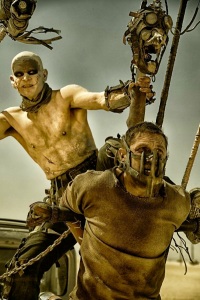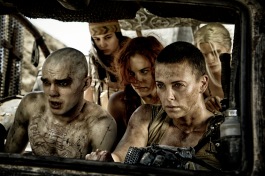 I never fell in love with a Spielberg film. It’s difficult however, not to foster a respect for his filmmaking formula when films like Jurassic World roll around – films that beg to be as cohesive a heartstring tugger as E.T, as expertly manipulative as Indiana Jones but fall way short due to lack of care and imagination. Unluckily for it, Jurassic World suffers from having the $1 billion-grossing classic, Jurassic Park (1993) as its ancestor, a solid, well-organised film that does what it does excellently.
I never fell in love with a Spielberg film. It’s difficult however, not to foster a respect for his filmmaking formula when films like Jurassic World roll around – films that beg to be as cohesive a heartstring tugger as E.T, as expertly manipulative as Indiana Jones but fall way short due to lack of care and imagination. Unluckily for it, Jurassic World suffers from having the $1 billion-grossing classic, Jurassic Park (1993) as its ancestor, a solid, well-organised film that does what it does excellently.
The story here is very much the same. Humans have made a theme park full of genetically engineered dinosaurs, the dinosaurs get out and there’s lots of death while everyone evacuates and the threat is neutralised. Many motifs/scenes from the original film are ruthlessly re-exploited:
- There are two parentless kids. There’s a man, there’s a woman and there’s sexual tension between them as they fall into the roles of surrogate parents for the children.
- There’s a big establishing shot of the park with that brassy 5-note theme.
- There’s a bit where a crazy “chaotician” warns us with glee that any control humans imagine they have over dinosaurs is an illusion.
- There’s a bit of hiding under cars and a bit of cowering in cars and a crunch of teeth on a vehicle roof.
- There’s a bit of “hey, you might’ve pushed science a bit too far.”
 Spielberg’s original was all about the tech. There really wasn’t much besides running away from dinosaurs because there wasn’t room for anything else. What makes it a bit of an anomaly in Spielberg’s canon is that it sacrificed satisfying character development for the sake of thrilling animatronic puppets – a strange stroke of genius, a choice that focused its concerns solely on being a thrilling ride. Jurassic World, however, suffers a crisis of confidence, assuming that “Wow! Dinosaurs!” isn’t enough for a 2015 audience. That’s the only explanation for the jarring amount of token storylines ignited and then abandoned or awkwardly under resolved in deference to the main issue of Running Away from Dinosaurs.
Spielberg’s original was all about the tech. There really wasn’t much besides running away from dinosaurs because there wasn’t room for anything else. What makes it a bit of an anomaly in Spielberg’s canon is that it sacrificed satisfying character development for the sake of thrilling animatronic puppets – a strange stroke of genius, a choice that focused its concerns solely on being a thrilling ride. Jurassic World, however, suffers a crisis of confidence, assuming that “Wow! Dinosaurs!” isn’t enough for a 2015 audience. That’s the only explanation for the jarring amount of token storylines ignited and then abandoned or awkwardly under resolved in deference to the main issue of Running Away from Dinosaurs.
The subject most criminally raised and discarded is the impending divorce of the boys’ parents (who we see only in short scenes that bookend the movie). Spielberg loves divorced children in his adventure movies; he loves taking them on a journey towards accepting their situation by learning to look after themselves. They work through their domestic problems by being involved in lots of thrilling stuff and come out stronger as a result.
 But here, children run from danger, hide from danger, and have it defeated around them. By adults – by male adults – while the female lead quails with them in a van, sitting in its passenger seat, shielding them from watching dashboard-based battle updates. “Your boyfriend is badass!” they squeal as Owen roars by on a motorbike. She smiles and that’s that – the film has betrayed its young characters. The children end up props. Props for the love story and props for Claire’s lesson: ‘tone down your ambition and make more time in your work schedule for spending time with family’ – a dubious lesson and one more forced than learned anyway.
But here, children run from danger, hide from danger, and have it defeated around them. By adults – by male adults – while the female lead quails with them in a van, sitting in its passenger seat, shielding them from watching dashboard-based battle updates. “Your boyfriend is badass!” they squeal as Owen roars by on a motorbike. She smiles and that’s that – the film has betrayed its young characters. The children end up props. Props for the love story and props for Claire’s lesson: ‘tone down your ambition and make more time in your work schedule for spending time with family’ – a dubious lesson and one more forced than learned anyway.
Jurassic Park earned a bomb, Jurassic Park re-released in 3D earned a bomb and no one who wants more money could argue against re-realising the exact same film but with more people in the way of the dinosaurs and all the latest CGI, 3D and IMAX technologies to animate them (the dinosaurs, not the people.) Jurassic World is pretty terrible but (sigh) pretty entertaining. I do enjoy watching prehistoric beasts wreaking havoc as much as the next person. I’d just rather this film didn’t pretend to care about its characters and their lives when it can’t afford to.
“Wow! Dinosaurs!” gets you a long way, even now.












